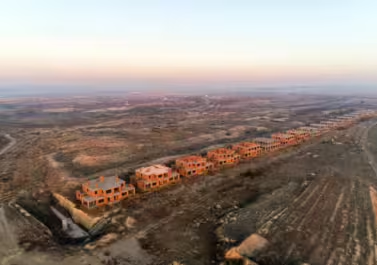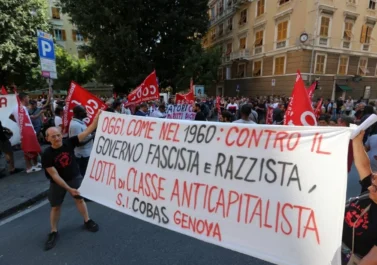
The Tyranny of Structurelessness (Jo Freeman, 1970)
The Tyranny of Tyranny (response by Cathy Levine, 1974)
The two texts were discussed by Angry Workers reading groups in Bradford, London and then online in October 2022. We wanted to find out what relevance they have to present day debates about the revolutionary purpose, formation and culture of political groups including our own. A short summary is followed by lightly edited post-reading reflections from six of the readers. Here’s a taste:
· None of us have delusions about building a mass revolutionary party, but we may need to leave behind existing as ‘friendship groups’ or the ‘circle spirit’.
· It’s shocking how relevant those 50 year old texts are still today.
· Structure in itself doesn’t remove informal hierarchies, but informal groups don’t necessarily challenge them.
· All organisations depend on a handful of people who have dedicated their life to it.
· Freeman’s reform recipe has its roots in democratic and rationalist ideas that still cause confusion among revolutionaries.
· We questioned how accurately [Freeman’s article] reflects the experience of the early women’s liberation movement.
Summary
The Tyranny of Structurelessness made an impact in the expanding radical feminist and sympathetic left/anarchist ‘scenes’ of the 1970s because it proposed an answer to two questions. How do we move from being a cultural phenomenon based on consciousness raising in small, informal local groups, to an effective political movement at scale? And how do we prevent existing social hierarchies and ‘tyrannies’ from reappearing in our own organisations?
For Freeman, by 1970 the time for lightly organised ‘rap groups’ and introspection was already over. Women now needed to gear up and become a formal political force. This would require organising at a larger scale, and therefore clear principles of organisational practice. On one hand, she blames the informality of the ‘rap groups’ for permitting elitism to arise within the groups themselves: “Meetings award prizes to the more aggressive, rhetorical, charismatic, articulate (almost always male)”. And on the other, since we need to scale up and mobilise, rules will be needed around how decisions are made; and those rules will help neutralise the elitism endemic in the little groups. It’s worth summarising her eight principles, because we can see their echo in present day systems thinking such as cybernetics or sociocracy, and how they influence both ‘progressive’ business theory and left-feminist debates on ‘the organisation question’:
- Delegation of specific authority to specific individuals for specific tasks by democratic procedures.
- Requiring those to whom authority has been delegated to be responsible to all those who selected them.
- Distribution of authority among as many people as is reasonably possible.
- Rotation of tasks.
- Allocation of tasks along rational criteria.
- Diffusion of information to everyone as frequently as possible.
- Equal access to resources needed by the group.
Although Freeman herself was a US left-democrat, The Tyranny of Structurelessness was most fiercely debated in anarchist circles, where her critique of small group elitism was interpreted as an attack on the practice of affinity group organising and anarchist federalism. Cathy Levine’s Tyranny of Tyranny defended the small group organising method. Levine says that domination and elitism can be most quickly identified and challenged in small circles, and that building relationships of friendship and trust are a sound basis for solidarity and collaboration. She pointed out that formal principles and structures in themselves would not stop elites, or the domination of bad actors skilled at hacking any codex of rules. The last part of her reply is a celebration of anarchism as such.
Reflections from the reading groups
1 (BW Yorkshire and online readings)
I kind of agreed with a lot that each of them said. There’s maybe a middle ground/ something to be gained from both perspectives.
It raises the question of who these group membership applies to – do groups need to formally be joined? Where do friendships stop and comradeships start?
Sometimes differences in power are ok/legitimate, whether a group is structured or not – related to commitment, experience etc. But without ways of dispersing power others will stay on the outskirts. This made me think of how people bob in and out of groups in an uncommitted way. The west Yorkshire group liked what Freeman wrote about the ‘star’ who becomes an unofficial spokesperson, a big personality who is then easily demonized. We all recognized that role and the role of being powerful and responsible isn’t always a pleasant one. People can get stuck in it just as they can get stuck in disempowered positions.
Remembering the reasons behind women only/consciousness raising groups: the sense that women need that separate space to develop those ideas, when men dominate in other groups. Levine’s writing speaks to this, the need to overcome how we have learnt to behave with each other, including due to patriarchy as well as capitalism.
In reality structures don’t remove informal hierarchies, but informal groups don’t necessarily take the required steps to challenge them.
Considerations for Angry Workers: being a male dominated group, informal power structures which have legitimate basis, but may be hard to disperse. The question of group size was discussed in the reading group – are less structured groups always going to wane to a limited size? I thought the text didn’t really explain much, it remained fairly superficial when trying to understand power and hierarchies in smaller informal groups and when suggesting how to overcome this through formalisation in bigger organisations.
2 (off line reading)
I thought the text remained fairly superficial when trying to understand power and hierarchies in smaller informal groups, and when suggesting how to overcome this through formalisation in bigger organisations.
When it comes to the analysis of power in small informal groups the text mainly refers to ‘friendship circles’ and group dynamics, but doesn’t really explain the source of power. I think it would have been more useful to look at how to deal with following imbalances within small groups: some people have more experiences; some people have more time or are willing to dedicate more time to the group; some people have more confidence due to class background or their position in a sexist society. There is no organisation that does not depend on a handful of people who have dedicated their life to it. Who does, decides. They are the force of activity and continuity, they become stumbling blocks if no wider collective dynamic sets in. But this collective dynamic is different from formal boundaries, which more often than not either stifles engagement or creates illusions that the actual source of power lies in a formal role or can be checked by formal regulations.
When it comes to larger groups and her suggestions how to be more effective and to avoid informal power structures through formalisation, I felt that she depoliticises the relation between form and content. Her suggestions could apply to any organisation – she doesn’t specify the political goal of the organisation or the relation to the wider social or class movement, the role of the organisation within the movement. While it might sense to create a federalist structure for a larger syndicalist organisation that primarily tries to support and coordinate strikes, this would make less sense in order to create a political organisation whose prime role is to analyse a class movement and discuss strategic intervention. Here I feel the text would have had to refer to wider historical debates: the difference between federalism and centralism, between delegation and representation.
Without wanting to talk negatively about the work of others, the IWW is a pretty good example for the fact that formalisation itself doesn’t create an effective organisation. I have rarely seen an organisation that dedicates such large amounts of work and resources for its own reproduction as a formal body, while the actual outcome in terms of theoretical or practical work is minimal. The formalised structure also didn’t prevent the formation of internal cliques that tried to use union resources in their favour, e.g. when it comes to obtain freelance work for friends. Don’t get me wrong, I think on the scale of an organisation such as the IWW, with several hundred if not thousand members, you need a strong formal structure – but this doesn’t replace the primary need for a political vision or ‘militant discipline’.
3 (on line reading)
I came away reassured that after 50 years the texts were still relevant. I agreed with what I thought was a general feeling that, between the two texts, Freeman’s had more to offer. Despite her personal political trajectory, the principles and seven points at the end of the document are well worth regularly revisiting. Personally, I also experienced an uncomfortable jaw-dropping moment with Levine’s parting shot that “Meetings award prizes to the more aggressive, rhetorical, charismatic, articulate (almost always male)”.
There is certainly food for thought in Freeman’s approach if we try to apply it to Angries in its current stage of evolution. If we are really comfortable with anything approaching (even tongue in cheek) Bordigist ‘organic centralism’ then we are certainly bound towards a sclerotic praxis. Opaque systems of power and control are very likely to become embedded. As last night’s discussion touched on, that might also connect with a Lilliputian future with an inability to attract and assimilate a significant number of new comrades from outside ‘the circle’.
None of us share ‘official Leninist’ delusions about building a mass revolutionary party, but we may need to consciously leave behind the marks of existing as ‘friendship groups’ or the ‘circle spirit’. ‘Trust’ and ‘comradeship’ are different concepts, vital to nurture. As a collective, we need to find ways of working that best enable us to develop positive interactions with existing and new comrades. That applies whether or not they are already part of the ‘pro-revolutionary milieu’ or in the infinitely broader working class.
4 (online reading)
Freeman was impatient to cut the chatter and ‘get organised’. It reminded me that in 1970 the emerging ‘movements’ were near their high point of radicalism, and working class power was near its post-war zenith too. Nowadays revolutionary groups are used to slim pickings, and even the far left is used to managing expectations.
Freeman’s reform recipe has its roots in democratic and rationalist ideas that can cause confusion. For instance there’s the contradiction between ‘allocating tasks on a rational basis according to skills and aptitudes’ on the one hand, and ‘rotation/sharing of tasks’ on the other. Democracy understood as one-person-one-vote doesn’t translate into organisational effectiveness – it’s a last resort, privileges debate over action and can entrench disagreement. In small groups it often signals splits, resignations or even expulsions, while leaving everyone drained.
We definitely need a better way to dismantle inequalities of voice and raise peoples’ capacity, without getting bogged down in the mechanics of proposing-clarifying-deciding-acting as a political collective – especially when we have a big political mission backed by small resources in terms of people. ‘Do-ocracy’ has to be the way. It’s quite possible to have a consent-based and accountability culture that acknowledges and supports collective and individual leadership, makes best use of comrades’ time and energy, and at the same time equalises voice, trains us to be more effective comrades, and values principled dissent.
Wanting to focus on the internal dynamic of political groups is understandable, but there’s a bigger question of how this debate relates to the question of practical governance in the future communist society at different scales – internationally/regionally, primary assemblies, and essential production.
5 (online reading)
It is very shocking how relevant those 50 year old texts are still today. Jo Freemans text The Tyranny of Structurelessness perfectly describes my personal activism experience in West Germany from the 2000s until today: high fluctuation of people, due to burn-out comrades/allies stop doing politics, no clear aims or strategy etc blabla. So yes, sadly the text is almost as relevant as 50 years ago. One comrade remarked that today among militants we take a certain level of sensitivity for personal access to resources/privileges/identities for granted so actually the New Lefts’ impulse of affinity group and self- help group based political activism was historically helpful.
The two texts lead a discussion that is today very present in the German radical Left again: Autonomous/Anarchist groups reach the limitation of their political strategy so claimed – ‘structurelessness’ and some groups and organisations actually re-discuss in different variations an anti-authoritarian v neo-Leninist organisational-strategy (for instance in these websites: https://jacobin.de/ https://www.akweb.de/ https://revoltmag.org/ and https://lowerclassmag.com/ ). Apparently, the very same polarised discussion the West-German left already had from 1968 onwards. It led to a split into wannabe-avantgarde-proto-‘communist’-party-groups and more anarchist inspired autonomous groups (the old red/black divide… or just Monthy Python’s Life of Brian).
I find it very difficult to criticise the texts in the abstract without sounding super mundane. Of course to get things done, one does need some mode of organisation, strategy and tactics. However neither does having a formal structure eliminate informal dynamics by default; nor should structure choke vibrant dynamic interaction and spontaneous initiatives. Best example for this is probably any nation-state bureaucracy in the world, or historically stalinism or the Occupy movement and Arab Spring, showed the pitfalls of certain (non-) structures. So an age old key question is how to structure in a way that has anti-corruption feedback loops in-built? Jo Freemans text suggests a hands on list for that at the end.
The second text The Tyranny of Tyranny by Cathy Levine to me appeared like the author did not properly understand Jo Freeman in the first place. Still it raises a valid point: for successful leftist militants, any kind of macho-culture is a massive obstacle that we cannot afford.
Throughout the online discussion it became clear to me that friendship based affinity groups are unsuitable as an organisational foundation. However friendship and affinity groups are very relevant for certain political actions – and what kind of lefty movement or organizing is it, if we do not have friendship emerging among us sooner or later?
The discussion reminded me of a very useful book-essay: Comrades by Jodi Dean. The author investigates theoretically the concept of comrade(-ship) and how it differs from kinship, colleagues or friendship. I guess that is exactly the crucial point: how to form political organisation and personal relationships that help us get things done in the struggle. According to Jodi Deanot potentially anybody can become a comrade, but not everybody, as there is a capital vs. labour conflict and it is up to each and every individual to choose which side they are on. The essay might be a good read for our group. Comrade is suggested as a term for sharing communist views, trust, commitment and reliability – so within this framework it is possible to work together on a bigger scale and to hold each other accountable and criticise in solidarity for the sake of fighting capital.
I really enjoy the Angry Workers reading groups. It is a good debating atmosphere, and always very insightful.
6 (London reading)
Our general impressions of the Tyranny of Structureless were mostly positive. We found it relatable and agreed with a lot of both the analysis and proposals, although found some points overstated or simplistic (e.g. the idea ‘unstructured’ groups are unable to address internal hierarchies). We also questioned how accurately the article reflected the experiences of the early women’s liberation movement.
We were much more critical of the Tyranny of Tyranny, with judgements ranging from ‘vague’ at the most positive to ‘almost unreadable’ at the most critical.
Some topics we covered over the course of the discussion: the danger of cult dynamics, the danger of bureaucratisation, the importance of accountability, consciousness raising, burnout, federalism, council communism and anarcho-syndicalism (transparency, recallable delegation, rotation of tasks, etc.), the risks of specialisation, how to reconcile organisational democracy with revolutionary integrity (examples of the SPD and CNT), the place of friendship in political groups, the transmission of experience…
I thought it was one of the best discussions we’ve had so far. I think it helped that it was a small group of us who’ve been meeting together for a while now, but also that the text is one that we found easy to relate to our direct experiences. This time round it felt like we built actively on each other’s comments and observations, in contrast to some more disjointed conversations in the past.



